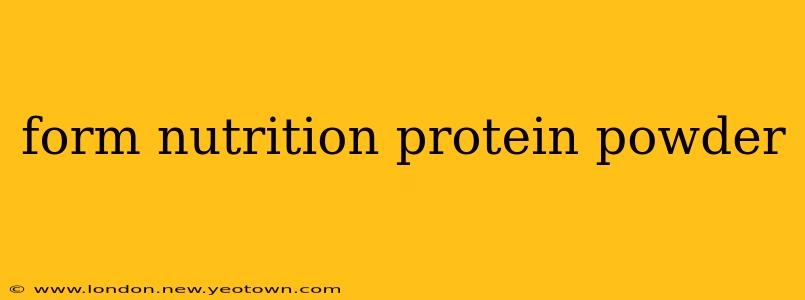Protein powder. The very words conjure images of ripped physiques and sculpted muscles, but the reality is far more nuanced. Choosing the right protein powder isn't just about building muscle; it's about fueling your body, supporting your goals, and finding a product that seamlessly integrates into your lifestyle. This isn't just another protein powder review; it's a journey through the world of protein, helping you navigate the choices and find your perfect fit.
What is Protein Powder, and Why Should I Use It?
Our story begins with the fundamental building block of life: protein. It's essential for building and repairing tissues, making enzymes and hormones, and even supporting your immune system. Protein powder provides a convenient and concentrated source of this crucial nutrient, making it a valuable addition to any diet, especially for those who are physically active. Think of it as a supplement, boosting your overall protein intake, not replacing whole foods.
Imagine Sarah, a busy professional and marathon runner. She struggles to consume enough protein through her meals alone. Enter protein powder. A quick shake post-run helps her replenish her muscles, recover faster, and stay energized throughout the day. This is the power of protein powder – bridging the gap between your nutritional needs and your busy lifestyle.
What are the Different Types of Protein Powder?
The world of protein powder can feel overwhelming, with a dizzying array of options available. Let's break down some of the most popular choices:
Whey Protein:
This is the most common type, derived from milk. It's quickly digested, making it ideal for post-workout recovery when your muscles need protein fast. Whey comes in different forms:
- Whey Concentrate: A more affordable option with slightly lower protein content and higher lactose.
- Whey Isolate: Higher protein content and lower lactose, making it suitable for those with lactose sensitivities.
- Whey Hydrolysate: Pre-digested, making it even faster absorbing than isolate.
Casein Protein:
Also derived from milk, casein digests slowly, providing a sustained release of amino acids over time. This makes it an excellent choice for before bed, keeping your muscles nourished throughout the night.
Soy Protein:
A plant-based option, soy protein is a complete protein, meaning it contains all nine essential amino acids. It's a good choice for vegetarians and vegans, and generally well-tolerated.
Pea Protein:
Another plant-based option, pea protein is hypoallergenic and easily digestible. However, it might not be as complete a protein as soy or whey.
Brown Rice Protein:
A hypoallergenic plant-based protein, often combined with other plant proteins to create a complete amino acid profile.
Choosing the Right Protein Powder for Your Needs:
The best protein powder for you depends entirely on your individual goals, dietary restrictions, and preferences. Consider these factors:
- Your fitness goals: Are you aiming to build muscle, lose weight, or simply maintain your current fitness level?
- Dietary restrictions: Are you vegetarian, vegan, or do you have any allergies or intolerances?
- Digestibility: How well do you tolerate different types of protein?
- Taste and texture: Protein powders come in a variety of flavors and textures. Find one that you enjoy!
What are the potential side effects of protein powder?
While generally safe, excessive protein intake can sometimes lead to:
- Digestive issues: Bloating, gas, and constipation are common side effects, especially when starting with high doses or using powders you don't tolerate well.
- Kidney problems: High protein intake can stress the kidneys, particularly in individuals with pre-existing kidney conditions.
- Weight gain: While protein helps with weight management, excess calories from protein powder can lead to weight gain.
Always consult your doctor or a registered dietitian before making significant changes to your diet, especially if you have any underlying health conditions.
How much protein powder should I consume daily?
The recommended daily protein intake varies depending on factors like your age, activity level, and overall health. A general guideline is 0.8 grams of protein per kilogram of body weight. However, athletes and individuals with specific fitness goals may require significantly more. Consult a healthcare professional or registered dietitian for personalized advice.
Can I use protein powder if I am pregnant or breastfeeding?
During pregnancy and breastfeeding, it's crucial to focus on a balanced diet rich in nutrient-dense foods. While protein powder can be a supplement, it shouldn't replace whole foods. Consult your doctor or a registered dietitian before incorporating protein powder into your diet during these critical periods.
How do I incorporate protein powder into my diet?
The beauty of protein powder lies in its versatility. You can add it to smoothies, shakes, oatmeal, yogurt, or even bake it into muffins and pancakes. Experiment and find creative ways to enjoy it!
This journey through the world of protein powder has hopefully armed you with the knowledge and confidence to make an informed decision. Remember, the best protein powder is the one that fits your lifestyle, dietary needs, and helps you achieve your fitness goals. So, take your time, explore the options, and embark on your protein-powered adventure!

